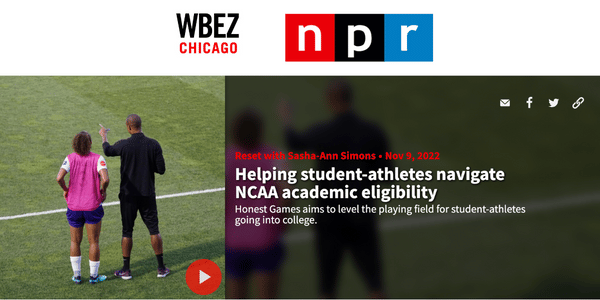Thinking Ahead: Top 5 Things Student-Athletes Should Think About Before Entering the NCAA Transfer Portal
Updated on Aug 8, 2023

For college student-athletes, the decision to enter the NCAA Transfer Portal can be a game-changer. Whether it’s to pursue new athletic opportunities, academic programs, or a change of scenery, entering the portal can offer exciting possibilities. However, it’s important for student-athletes to think ahead before making this significant move.
With so many factors to consider, it can be overwhelming to navigate the transfer process and ensure that academic eligibility, athletic scholarships, and sports programs align with your goals. In this blog, we’ll provide you with the top five considerations to help you make an informed decision about your future. Let’s get started!
Before you take the leap into the NCAA Transfer Portal don’t make a mistake that could jeopardize your future in college sports and ultimately finish your college degree.
1. You could lose your scholarship at your current school by entering the NCAA Transfer Portal, even if you change your mind and end up staying.
By entering the NCAA Transfer Portal you are essentially giving up your spot (and scholarship) on your current team. Even if you decide to stay, you may not be able to recover your scholarship. It is up to the coaching staff if they want to honor your original scholarship offer. It’s crucial to speak with your coach and athletic department when making any decisions that could impact your scholarship.
Also, if you owe any money to your current college/university, such as tuition bills, library fines, and parking tickets – your current school will not release your transcript. When this happens, you will not be able to compete or receive a scholarship at a new college until your existing school bills are paid.
Honest Game Insight – Speak with someone in the school’s Financial Aid Office to become better educated on whatever bills might be outstanding and what aid you are currently receiving from the Athletic Department.
2. You may lose access to all current student-athlete support services and facilities by entering the NCAA Transfer Portal.
The day you enter the NCAA Transfer Portal, your access to student-athlete services could be taken away. Access to daily perks like tutoring, academic advisors, strength and conditioning facilities, athletic training room, team meals, and locker rooms could all be denied.
Since you are no longer considered a “student-athlete” who plans to return the following season, those services are no longer promised to you.
Keep in mind that most student-athletes will create video highlight clips and athletic stats to include on their NCAA Transfer Portal Profile Page. Be sure you have access to create the videos and stats before entering the portal.
Honest Game Insight – Think about the timing of when you enter the NCAA Transfer Portal and whether or not you can continue the semester without those services. Research services for the general student population at your school and become familiar with how to sign up and access them before you enter the NCAA Transfer Portal.
3. Will the grass actually be greener at a new school?
Many student-athletes feel their current situation could not get any worse and that another school, coaching staff, or team would definitely be better. Transferring to a new school can be an exciting opportunity, but it’s important to consider whether a new school will be a better fit for you. Will you have more playing time? Better academic programs? Improved coaching? Make sure you thoroughly research potential schools before making a decision.
While it is a violation to speak to a coach from a different school before entering the NCAA Transfer Portal, you are permitted to speak to student-athletes and alumni at any time to gain a better understanding of the prospective program.
Honest Game Insight – Make a list of the reasons you want to transfer and research to see if those items can be found at your new prospective school. Ask current and former players questions about their experience, making sure to mention the parts of your current experience that you are currently not happy with. Maybe the early morning practices, lengthy running workouts, or missed-class policies you hate now are also expectations at your next school.
Can your situation change at your current school by next year?
Are you unhappy with the playing time you hoped for? Will that be different next year? Were you playing behind a strong upperclassman who had more college playing experience? Will they be graduating and opening a spot for you and next year could be much different? These are all questions and scenarios to consider before making the often stressful decision to transfer schools.
Speak candidly with a member of your current coaching staff about where they see your role next year. Maybe your time has come and patience is on your side. Leaving now and transferring to a new school could put you in the same position you were in last year, but with a new team of veterans.
Are You Entering the NCAA Transfer Portal Because Your Current Coaching Staff Has Left?
The collegiate coaching carousel and transient nature of coaching mean that the coaching staff who recruited you may not be there on graduation day. Did your coaching staff leave for another job and now you are left wondering if the new staff will see your role the same? Are you entering the portal because you are nervous about what next year will bring?
Consider staying at your current school and giving the new coaching staff a try. You have comfort in this school. You’ve established yourself, made friends and you’ve navigated being a student-athlete with your school’s resources. Transferring schools now will not only have you starting over at a new school with a new staff but also in a new environment. If you have to play for new staff, at least have it be at the place you already know.
4. Make sure you are not violating any recruiting rules once you’re in the NCAA Transfer Portal.
Once you enter the NCAA Transfer Portal, coaches from other schools can contact you. However, it’s important to make sure you’re not violating any NCAA recruiting rules during this process. Familiarize yourself with the rules and regulations to avoid any potential violations.
For example, coaches are not allowed to contact you until after you have entered the NCAA Transfer Portal, so if you receive contact before then, it could be a violation.
ID Camps or Showcases are ideal opportunities to show off your athletic talent as a transfer student-athlete. Prior to registering for an ID Camp or Showcase, make sure it is open to currently enrolled college athletes and that you have already entered the NCAA Transfer Portal before registration.
People in your support circle, may not know all of the current recruiting rules. Be sure to speak with Compliance Officer to confirm.
5. Are you academically eligible to play at your new school?
Just getting accepted at a new school and receiving an offer for an athletic scholarship does not mean you will be able to compete upon transfer. Transfer student-athletes must meet specific and nuanced academic eligibility rules if they want to compete at their new school. Too many student-athletes have learned the hard way and been barred from transferring to an NCAA DI or DII college due to academic eligibility issues.
Students must have passed at least 6 credits in the term before they transfer and depending on the year in school, 18 credits between fall, winter, and spring terms prior to transferring.
Additionally, student-athletes who begin their junior year (5th semester) must have 40% of the degree completed at their new school upon entry. That means roughly 48 credits from your first school must be directly transferable and degree applicable to your major at your new school.
Many schools also have transfer rules that only allow grades of C or higher to transfer, and thus students usually lose credits during transfer. Make sure to investigate whether you are eligible to be accepted into the major you want at your new school. These are usually pieces of the puzzle that may only be directly answered once students are ready to enroll at their new school and released from their previous school.
Honest Game Insight – Speak with Admissions or Academic Advisors at the new school prior to entering the NCAA Transfer Portal. These are all professionals who can speak with you per NCAA rules and will be able to offer a Preliminary Transfer Evaluation of your current classes.
At some schools, there is a limit on the number of transfer credits they accept. For those transfer student-athletes entering a new school in their senior year (7th semester), they will need to bring in 72-degree applicable credits of C or higher at most schools to be eligible. Unfortunately, some universities have transfer caps that don’t allow for this possibility, and even if you have a 4.0, you can not transfer and be eligible to compete right away.
How Close to Graduation Are You? Will You Be Transferring for a Graduate Degree?
Some students are efficient with their time at their first school and complete their degree with a year or two of eligibility remaining. These “grad transfers” are allowed to enter the NCAA Transfer Portal, attend a new school, and compete while in a graduate program. However, some students rely on summer school to finish their undergraduate degree. Once students enter the NCAA Transfer Portal, their institution does not need to pay for summer school during the summer prior to transferring to graduate school, and thus, student-athletes are left with a tuition bill. Those who can’t afford to pay for summer credits can not graduate, transfer and compete.
Educate yourself early on about your progress towards graduation and how many credits you need to complete your degree, and when those courses are offered. If you think you may be transferring for graduate school, start planning in your junior year and work with your Academic Advisor to schedule your coursework to be completed during the spring of your senior year.
Have more questions about entering the NCAA Transfer Portal or are interested to know where you or your student-athletes’ academic eligibility status stands? Honest Game Counselors are available to provide one-on-one assistance to support student-athletes in navigating post-secondary opportunities athletically and academically. Schedule a time to meet virtually with our experts.
Have more questions about entering the NCAA Transfer Portal or are interested to know where you or your student-athletes’ academic eligibility status stands? Honest Game Counselors are available to provide one-on-one assistance to support student-athletes in navigating post-secondary opportunities athletically and academically. Schedule a time to meet virtually with our experts.

As a former Senior Associate Athletic Director at the NCAA Division I level and with more than 20 years of experience in collegiate athletics, Courtney has advised thousands of student-athletes through the college recruiting and eligibility process for college sports. Interested in virtual counseling with Courtney? Sign up here.



